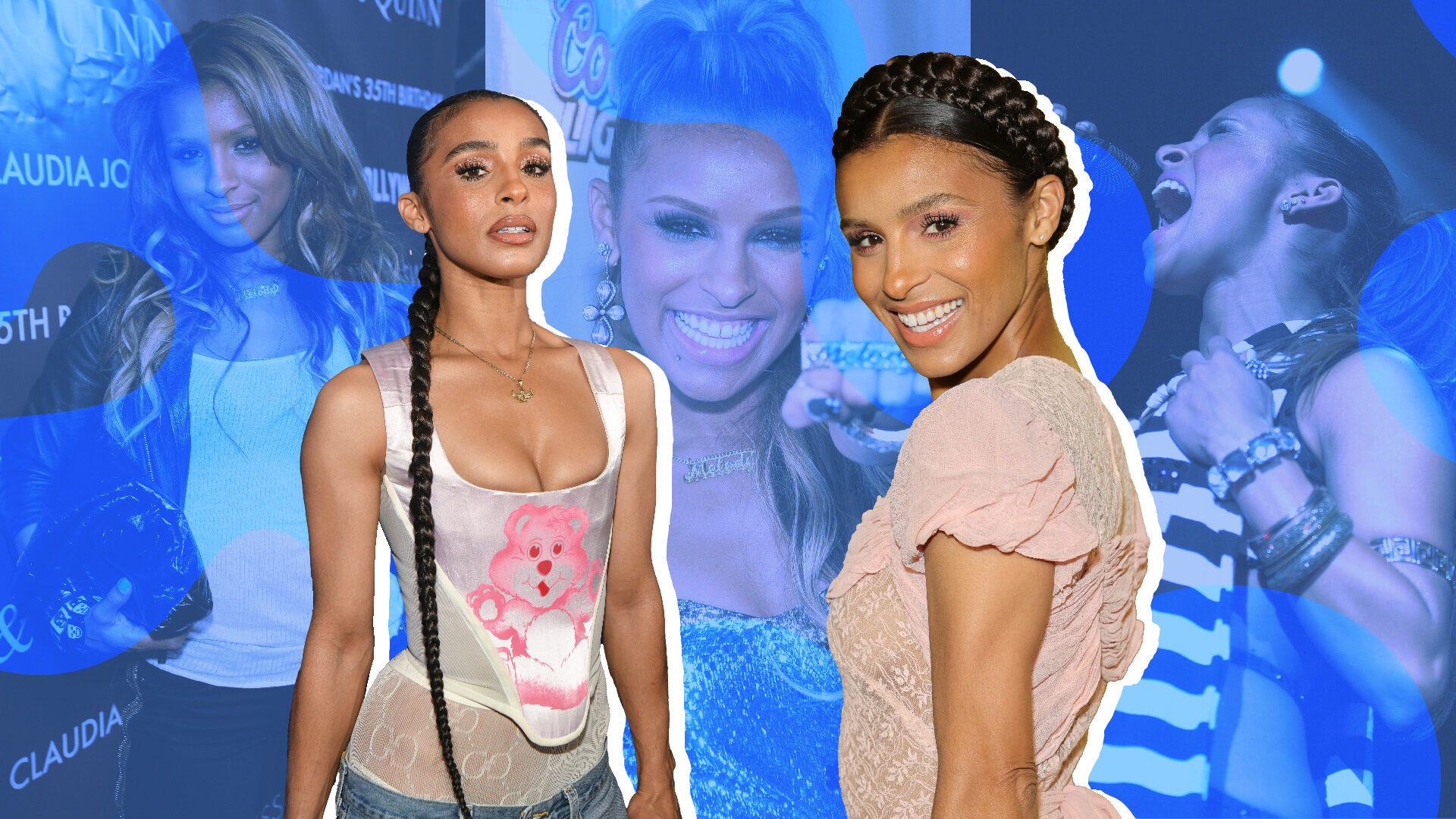
Surprisingly, auditioning for the group was her first entertainment-based audition ever, which would eventually catapult her into being one of the lead vocalists next to Nicole Scherzinger, who was nearly seven years her senior. “The pressure of being compared to everyone who had all this experience, I didn’t always feel that people understood that I feel pain at the same rate that you do,” Thornton, now 38 years old, noted of her experience at an early age.
She admitted that the success and superstardom following their 2009 “Don’t Cha” single had a negative impact on her mental health and her mental wellness “was not good.” The group went on to release charting singles including “Beep,” “Stickwitchu,” and “I Hate This Part,” but young Thornton’s mind was on the overall wellbeing of her mind, body, and spirit. Thornton even admitted that there were things happening in the industry and to her that she didn’t share with her parents, but is controversially glad that she didn’t because they “would’ve wanted me to quit.”
“I was definitely frequently suffering from panic attacks, keeping things to myself, because I didn’t want anyone to say that I was lazy or that I was making things up,” Thornton confided. During her time in the group, she tried her damndest to keep her image squeaky clean and away from the tabloids while in the limelight as she moves into her early twenties. “I am just like you. I understand that if you want to be here, be here and make it happen so I always send love to my younger self and be like, ‘okay girl, you did that. You pulled it off somehow,’ but it wasn’t good. My mental health was in a really rough shape. I guess I didn’t feel I could trust anyone.”
Three years following her departure from PCD, she admittedly sought out mental health resources and it shows. In a floral top, hair pulled back, and the same infectious smile she’s had since their “Sway” debut in 2004, Thornton sat in front of me on Zoom a whole, complete, and content woman. I remember belting my heart out to her riff towards the end of their “Buttons” single when I was just fourteen years old and thinking to myself that I wanted to be as talented and beautiful as she is. Now, I had the opportunity to give her her overdue flowers for making me, and other Black and Afro-Latina girls, feel seen as a young Black girl who just wanted to be in the spotlight.
Thornton became misty-eyed and dabbed the corner of her eyes with her dainty finger to keep her tears from running. One part of the tears was of gratitude, and the other was a sense of pride for how far she’s made it since those years with The Pussycat Dolls.
“It makes me emotional because I always, it was like a lot of pressure whilst I was there. The one thing that I always kept in mind was, ‘You can’t be messing up. You got to keep it together because you are the Black girl. People know that, people see it, and they want to see you win so you must prevail through any adversity – whatever it looks like.’ I appreciate you saying that so much because I didn’t always know if I was being seen,” she said emotionally. Indeed, Melody Thornton, you are and always will be seen.
“Seeing Melody standing out in the group not just because she was Black, but for her style, dance skills and those vocals was crucial,” says music and culture journalist J’na Jefferson. “That visibility meant a lot during the early-aughts in particular, especially when there was such an influx of Black vocalists pushing through the previously white-focused mold in pop like Amerie [and] like The Sugababes. To be in a largely-white girl group and make a name for yourself by just being purely talented? That’s huge.”
Adds Jefferson, who has also been a dancer since childhood and always admired the confidence, sex appeal, and aesthetic of The Pussycat Dolls, “Speaking from the standpoint of someone who really looked up to PCD and what they stand for, it’s really important for women of color to see that feminine power and success are both attainable and achievable, and not just only for white women as it’s often postured to be for in the media.”
Thornton was never naive to the fact that she was in a predominantly white group. In fact, she noted how hyper-aware of her position she was from the early stages when all eyes were on her as the only person of color – and not always in a positive way. “What I was a part of was, it was a white pop group. That’s what it was,” she said. She recalled “being misunderstood a lot” and not always wanting to sit and explain the parameters of her cultural identity to everyone in the industry.
“If you don’t understand my culture, you don’t understand my culture. You want me to have braids and beads, you got to hire someone who does braids and beads. It’s not me being difficult; there’s two sides to it,” she explained. “I can’t go out there with dusty braids and beads because people are gonna be like, ‘dang, she’s really out of touch, she doesn’t know herself, she doesn’t know her culture.’ It’s not that. It’s who’s hiring who and who’s doing what?”
From beginning to end, Thornton always felt like she had to be “on,” which is a term she used often during our conversation to describe the feeling of almost being in character as a famous young adult in a pop group. As someone who grew up as an athlete, Melody always appreciated the discipline of looking her best wherever she went but she admitted that it was oftentimes exhausting. “Did I feel pressure? The group that I was from was very sexualized and we were very objectified. My God.” To keep herself grounded, she would pen letters to herself and read affirmations aloud between tour stops.
“I loved that her style was fun and bubbly and made me want to dress like her. Of course, I was too young, but her makeup looks always were refreshing and her blonde highlights on her brown hair always stood out,” style and culture expert Venesa Coger told Girls United as she reflected on Thornton’s time in PCD. “I was instantly drawn to Melody because of her beauty, voice tone, and style. As the only Black girl in the group, she was a reflection on me.”
Jefferson brought attention to Thornton’s resurfacing fame in the Twitterverse, especially since winning Australia’s The Masked Singer. From there, videos have recirculated around the Internet streets of a young early-20s pop star belting her heart out on stage at award show performances and music video rehearsals. “I think time has been on Melody’s side. I’ve seen so many people online who have pointed out how strong her vocals have always been, and that she deserved a lot more time in the spotlight both in PCD and for her solo work,” Jefferson said of Thornton, who has been releasing solo singles since 2020 leading with “Love Will Return” into her Lionness Eyes EP.
“I think that even more positive retrospectives and present-day thoughts about her talents are going to keep coming to light as she releases new material,” she continued. “The funny thing about flowers is that while you may not smell them right away, there’s always someone who’s had a full bouquet waiting for you right next door.”
Upon her departure from The Pussycat Dolls, rumors churned out of the tabloids mill that she was beefing with other members of her group. While that wasn’t the case, Thornton had a hunch that this would happen the moment she step foot into the world solo and unattached to the brand that she was part of for so many years. “It really didn’t feel like taking power back. There were a lot of narratives I knew that I was going to have to battle out.”
Thornton continued, “It wasn’t an easy transition because it felt like a lot of hostility. I didn’t ever want to say anything to discredit other members of the group,” she said. “If I said what I needed to say to defend myself against narratives that were propping other people up, then I would be taking other people down. Just let the proof be in the pudding.”

While she, quite often, she added, felt the constant pressurized comparison between herself and the lead singer who was a few years her senior, Interscope Records’ famed record executive Jimmy Iovine always turned to her for marketing and sound ideas because her age bracket at the time was the audience that the group was trying to connect with. “Sometimes there were moments where I was heard because I was younger or the youngest. When I didn’t know something, I definitely was faking it and it worked, but you do have to have some real confidence.”
The Pussycat Dolls once said, “I want to be famous, I want to be a star,” but former member Melody Thornton has already done that. Just a week shy of her 38th birthday at the time, she confided that the best thing that she’s ever done for her mental health was step out of the spotlight and into her own being. “The best thing I ever did was just fall back and let it be and let people say whatever they’re going to say because I feel balanced for the most part – and I know when I’m not.”
As she reflects on the legacy she leaves behind for empathetic young Black girls in girl groups today including Little Mix’s Leigh-Anne Pinnock, Danity Kane’s Dawn Richard and D. Woods, and Fifth Harmony’s Normani Kordei, there’s also a certain something that Melody Thornton wants younger girls to know. “You just named a bunch of women that I’m like, I’m so proud of them. I’m so happy for them because you definitely have your moments where it’s like, ‘what I’m putting my energy into is growing a brand in an arena that doesn’t look for me.’ It’s lovely to see that they have a soft place to land and they are going,” Thornton praised each of their solo endeavors following their girl group experiences.
Thornton continued, “Whatever the narrative is, if it’s not true, keep doing you, keep pressing it, keep pushing it. Sometimes you got to poke the bear, bring it alive and then fight for yourself – and that’s that. That’s what it is. Don’t let anybody define you. You’re not defined by whatever narrative is being pushed and you have power in this world.”
About D’Shonda: Born and raised in Brooklyn, NY, D’Shonda Brown is the Associate Editor at Girls United. When she’s not interviewing or writing, she enjoys running, dancing, buying sneakers, and binge-watching Lifetime movies.